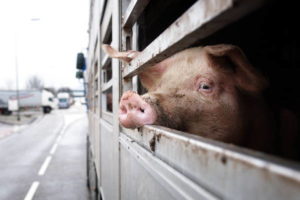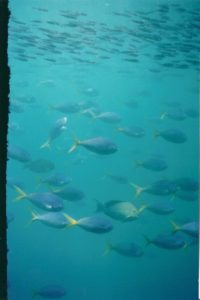Worldlog 17 april 2017
‘Zolang er slachthuizen zijn, zullen er slagvelden zijn.’ Een historische uitspraak van Tolstoj, de Russische schrijver, filosoof en politiek denker. Tegelijk nog steeds een zeer actuele uitspraak. Eind maart werden zeer confronterende undercoverbeelden van de dierenwelzijnsorganisatie Animal Rights openbaar gemaakt, die lieten zien hoe een slachthuis in het Belgische Tielt zo’n beetje alle regels voor dierenwelzijn en voedselveiligheid structureel overtreedt.
Schokkend, maar niet verbazingwekkend. Wetende dat in Nederland elk uur 650 varkens worden geslacht en controleurs nog geen vijf seconden hebben om een varken te keuren zijn ook de zorgen over de behandeling van dieren in Nederlandse slachthuizen groot. Daarom hebben wij in de Tweede Kamer gepleit voor verplicht cameratoezicht in slachterijen. En met succes! Ons voorstel is met grote meerderheid aangenomen. Een belangrijke stap naar meer transparantie. Zodat de sector dierenwelzijn serieuzer neemt en de consument bewuster naar het vlees op het bord kijkt. Want om met de woorden van Paul McCartney te spreken: ‘Als slachthuizen glazen wanden hadden, zou iedereen vegetariër zijn’.

Schokkende berichten waren er ook over onze onderwaterwereld. Het koraal in het Caribisch gebied dreigt binnen vijftien jaar te verdwijnen en ook grote delen van het Australische Great Barrier Reef zijn door verbleking aangetast als gevolg van de opwarming van het zeewater. Om het koraal te redden moeten we met z’n allen snel fors minder CO2 de wereld in blazen. In Europa hebben gelukkig veel landen hun emissie al flink naar beneden gekregen. Met als positieve uitschieter Groot-Brittannië dat een daling van 30 procent bereikte, mede door de invoer van CO2-beprijzing. Een doeltreffend instrument waar de Partij voor de Dieren ook voor pleit.
Toch moet de daling in Europa nog dubbel zo hard gaan om de doelstellingen van Parijs te halen. En Nederland – waar de CO2-uitstoot zelfs steeg naar het hoogste niveau ooit! – heeft nog veel grotere stappen te zetten.

Stappen die alleen gezet kunnen worden als regeringen afstappen van het destructieve mantra van groei, groei, groei. En overstappen op een economisch systeem dat uitgaat van de draagkracht van de aarde en de samenleving. Een systeem waarin we meer zijn dan alleen werknemers, consumenten en eigenaren van kapitaal. Kate Raworth van Oxford University’s Environmental Change Institute bedacht zo’n nieuw economisch model: The Doughnut. Lees hier dit interessante artikel daarover.
Mooie resultaten bij de gemeenteraadsverkiezingen in Finland. Vele stemmen binnengesleept. Helaas net niet genoeg om ook een raadszetel in 1 van de zes deelnemende gemeentes te bemachtigen. Maar zoals onze Finse zusterpartij het aangaf ‘Met het kleine team en het kleine budget heel blij met het resultaat.’
Tot snel. Hartelijke groet,
Marianne
‘As long as there are slaughterhouses there will always be battlefields.’ A historic quote by Tolstoj, the Russian writer, philosopher and political thinker. At the same time, it is still a topical quote. At the end of March, some highly confronting undercover images taken by the animal welfare organisation Animal Rights were published, which showed that almost all rules and regulations for animal welfare and food safety were structurally violated in a slaughterhouse in Tielt in Belgium.
Shocking, but not surprising. Knowing that 650 pigs are slaughtered every hour in the Netherlands and that inspectors get not even five seconds to check a pig causes also great concern about the treatment of animals in Dutch slaughterhouses. That is why we made a plea in the Lower House for mandatory CCTV in slaughterhouses. And we did so successfully. Our motion was adopted by a great majority. An important step towards more transparency, thus forcing the industry to take animal welfare more seriously and the consumer to be more conscious of the meat on his or her plate. And to quote Sir Paul McCartney: ‘If slaughterhouses had glass walls, everyone would be a vegetarian’.

There were shocking messages concerning our underwater world. The corals in the Caribbean are threatened to vanish within fifteen years and large parts of the Australian Great Barrier Reef are affected by severe bleaching due to the warming of seawater. To save the corals, we should all immediately reduce the emission of greenhouse gases into the atmosphere. Fortunately, many countries in Europe reduced their emissions considerably already. With Great Britain as a positive peak, which reached a reduction of 30 per cent, partly due to the introduction of its CO2 prices. An efficient instrument which is advocated by the Party for the Animals too.
Yet, greenhouses gases in Europe must be reduced twice as fast to meet the Paris climate goals. And the Netherlands – where the emission of greenhouse gases increased to the highest level ever! – still has to make great efforts.

Efforts that can only be achieved if the governments set aside their destructive mantra of growth, growth, growth. And change to an economic system that is based on the capacity of the earth and society. A system where we are more than just employees, consumers and owners of capital. Kate Raworth of Oxford University’s Environmental Change Institute thought up such new economic model: The Doughnut. Read here the interesting article about it.
Great results at the municipal elections in Finland. Many votes obtained. But unfortunately just not enough to obtain a municipal council seat in one of the six participating municipalities. But as our Finnish sister party pointed out ‘A great result with a small team and a small budget.’
Until soon. Kind regards,
Marianne